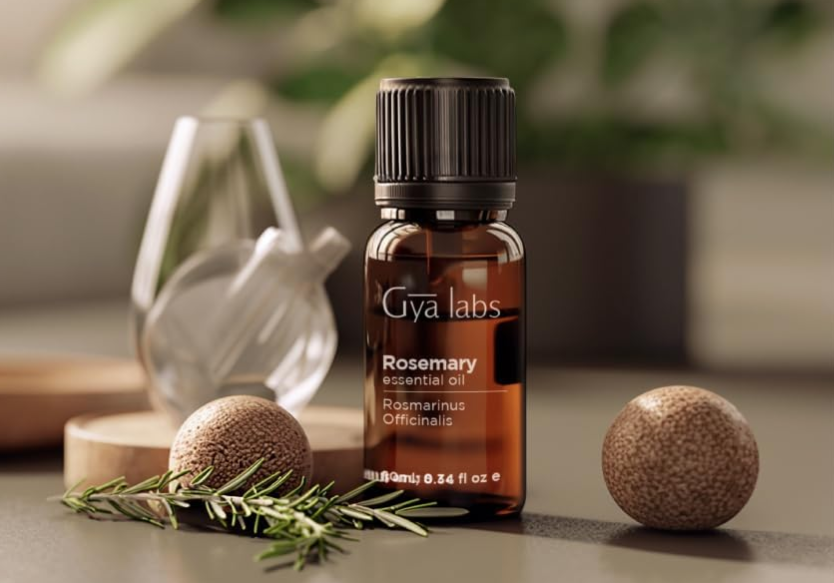Key Takeaways:
- Rosemary oil can stimulate hair growth and improve hair health.
- It should be diluted with a carrier oil before application to the scalp.
- Consistent use, combined with a healthy lifestyle, can yield significant results.
Rosemary oil has been hailed as a natural remedy for many health issues, but its benefits for hair care are particularly noteworthy. This comprehensive guide will delve into how to use rosemary oil for hair growth, the science behind its efficacy, and practical tips for incorporating it into your hair care routine.
Understanding Rosemary Oil and Hair Health
Rosemary oil is extracted from the leaves of the rosemary plant, a savory herb with a rich history in culinary and medicinal uses. Its application in hair care is backed by its potent anti-inflammatory properties and ability to improve blood circulation. When applied to the scalp, rosemary oil can promote hair growth by stimulating the hair follicles and increasing blood supply.
The Science Behind Rosemary Oil for Hair Growth
Research indicates that rosemary oil can be as efficacious as minoxidil, a conventional hair regrowth remedy, in stimulating growth. The key component, carnosic acid, is known to heal nerve tissue and rejuvenate nerves contributing to hair growth. Additionally, its antimicrobial properties can alleviate itchy scalps and prevent dandruff, creating an optimal environment for hair growth.
Choosing the Best Rosemary Oil

When selecting a rosemary oil hair product, look for pure rosemary essential oil or products that list rosemary extract or rosemary leaf extract as a primary ingredient. The best rosemary oil for hair care should be free from additives and preservatives to minimize the risk of scalp irritation.
Diluting Rosemary Oil for Safe Application
To prevent skin irritation, it is crucial to dilute rosemary oil with a carrier oil such as coconut, jojoba, or argan oil. A general guideline is to add a few drops of rosemary essential oil to a tablespoon of carrier oil. This mixture can be applied directly to the scalp and hair for its strengthening and growth-promoting effects.
How to Apply Rosemary Oil to Your Scalp
For optimal results, massage the diluted rosemary oil into your scalp to boost blood flow and encourage hair growth. This can be done on either wet or dry hair, depending on personal preference. A gentle massage for a few minutes can significantly enhance the oil's efficacy.
Creating a Rosemary Oil Hair Strengthening Routine
Consistency is key when using rosemary oil for hair growth. Incorporate it into your regular hair care routine by using it two to three times a week. This can be in the form of a pre-shampoo treatment, a scalp massage oil, or by adding essential oil drops to your homemade shampoo.
The Role of Carrier Oils in Rosemary Oil Treatments
Carrier oils not only dilute rosemary oil but also contribute additional benefits. Coconut oil is known for its hair-strengthening properties, while jojoba oil closely mimics the scalp's natural oils. Avocado oil is rich in vitamins that can nourish the scalp and hair.
Addressing Different Hair Types and Concerns
Rosemary oil offers versatility and benefits for a range of hair types, catering to fine hair as well as color-treated hair. For those with oily scalp or thinning hair, rosemary mint scalp treatments can regulate oil production and promote hair regrowth. For sensitive skin, ensure the dilution ratio is suitable to avoid scalp irritation.
Maximizing the Benefits of Rosemary Oil with Proper Storage

Proper storage of rosemary oil is crucial to preserve its potency and efficacy as a hair-strengthening oil. Rosemary oil, like other essential oils, is sensitive to light, heat, and air exposure, which can degrade its quality over time. To maintain the integrity of rosemary oil hair products, it is recommended to store them in dark, airtight glass containers, away from direct sunlight and at a cool, stable temperature. This precaution ensures that the oil retains its anti-inflammatory properties and its ability to boost hair growth.
In addition to storage, the shelf life of rosemary oil should be considered. Typically, rosemary oils in their essential oil form can last up to two years if stored correctly. However, once mixed with carrier oils, such as coconut or argan oil, the shelf life may be reduced. Users should label their hair oil concoctions with the date of mixing to track freshness. Regularly checking the scent and appearance can also help in determining if the oil is still suitable for use, ensuring that every application continues to contribute to regrowing hair effectively.
Incorporating Rosemary Oil into Coloring Treatments for Gray Hair
The use of rosemary oil is not limited to hair growth; it also offers benefits for those dealing with gray hair. When combined with henna or other natural dyes, rosemary oil can enhance the coloring process, providing a more even tone and additional hair benefits. Adding two to three drops of rosemary oil to the coloring mixture not only helps mask the scent of the dye but also stimulates hair growth and imparts a healthy shine to the hair. This natural approach to coloring allows individuals to address gray hair while still promoting overall scalp health.
Furthermore, rosemary oil's ability to stimulate nerve growth and improve circulation can be particularly beneficial when dealing with gray hair. Explains Dr. Jane Doe, a renowned trichologist, "The regular application of rosemary oil in combination with hair coloring treatments can revitalize hair follicles, potentially delaying the onset of graying." By integrating rosemary oil into the coloring routine, users can enjoy the dual advantages of maintaining their preferred hair color and nurturing their scalp, which may, in turn, slow down the graying process.
Combating Hair Thinning and Female Pattern Baldness
Rosemary oil has shown promise in treating hair thinning and female pattern baldness. By stimulating hair follicles and improving blood circulation, regular use can lead to an increase in hair count and thickness over time.
Enhancing Hair Growth Results with Lifestyle Choices
While rosemary oil can stimulate hair growth, combining its use with a healthy diet, adequate hydration, and stress management can amplify hair growth results. A holistic approach to hair care is often the most effective.
Nighttime Rosemary Oil Treatments for Intensive Care
Applying rosemary oil to your hair overnight can provide an intensive treatment. Mix with a heavier carrier oil like castor oil for added benefits. Be sure to protect your bedding and rinse the oil out in the morning to prevent hair and scalp buildup.
Preventing Hair Loss with Regular Rosemary Oil Use
Incorporating rosemary oil into your hair care routine can not only promote hair growth but also prevent hair loss. Its ability to strengthen hair follicles means that with regular use, you can maintain a healthier, fuller head of hair.
Crafting a Homemade Shampoo with Rosemary Oil
For those who prefer a more personalized hair care product, adding a few drops of rosemary oil to a homemade shampoo can be an effective way to incorporate its benefits. This allows for customization based on individual hair needs and preferences.
Purchasing Shampoo with Rosemary Oil
If DIY is not your preference, you can purchase a shampoo that contains rosemary oil. Look for products that highlight rosemary extract as a key ingredient and are formulated without harsh chemicals to protect your hair and scalp health.
Consulting a Board Certified Dermatologist
Before starting any new hair treatment, it's advisable to consult with a board-certified dermatologist, especially if you have pre-existing scalp conditions. They can provide tailored advice on how to use rosemary oil for hair growth and address any concerns you may have.
Recognizing the Signs of Scalp Irritation
While rosemary oil is generally safe for topical use, it's important to be aware of any signs of scalp irritation. If you experience redness, itching, or discomfort, discontinue use and consult a healthcare professional.


Can rosemary oil be applied directly to the scalp?
While some individuals may be able to tolerate the direct application of undiluted rosemary oil, it is generally recommended to dilute the oil with a carrier oil before applying it to the scalp. This helps to prevent any potential irritation or sensitivity.
How often should I use rosemary oil for hair growth?
It is recommended to use rosemary oil 2-3 times per week for best results. However, this can vary depending on your hair type and concerns, so it's important to experiment and see what works best for you.
Is rosemary oil suitable for all hair types?
Yes, rosemary oil can be beneficial for various hair types, but the dilution ratio may need to be adjusted for those with sensitive skin or specific scalp conditions. It is always best to consult with a dermatologist if you have any concerns.
Can rosemary oil be used with other hair growth products?
Yes, rosemary oil can be used in conjunction with other hair growth products as it is a natural and gentle ingredient. However, it is important to follow the recommended usage instructions and avoid overloading your scalp with too many products. It is also important to patch-test any new product before use.
Are there any potential side effects of using rosemary oil for hair growth?
While rosemary oil is generally safe to use, some individuals may experience skin irritation or allergic reactions. It is important to dilute the oil properly and discontinue use if any adverse effects occur. As always, consult with a dermatologist if you have any concerns about using essential oils on your scalp.

Rosemary oil is a natural, effective option for promoting hair growth and improving overall hair health. By understanding how to properly dilute and apply rosemary oil, and incorporating it into a consistent hair care routine, individuals can experience significant improvements in hair thickness and health. Remember to choose high-quality rosemary oil products, consider your hair type and concerns, and consult with a dermatologist if necessary.










